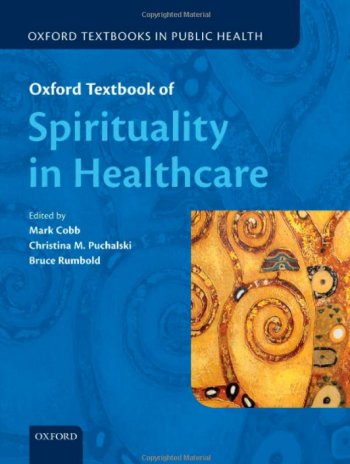Book Review
Oxford Textbook of Spirituality in Healthcare
Edited by Mark Cobb, Christina M. Puchalski and Bruce
Rumbold
Oxford
ISBN 978-0-19-957139-0
 "Healthcare
is challenged to respond to the ways spirituality is experienced
and expressed in illness, suffering, healing and loss."
"Healthcare
is challenged to respond to the ways spirituality is experienced
and expressed in illness, suffering, healing and loss."
This work most certainly achieves this purpose and can rightly be described as an authoritative reference on spirituality in healthcare. As one might expect from a work that brings together international contributions from scholars in the field, a variety of opinions are put forward. For the purposes of this review, areas of especial interest to the reviewer will be examined.
The chapter on "Psychiatry and mental health treatment" is a comprehensive overview of the subject. Case histories are given and it is noted that throughout most of the twentieth century, there was mutual distrust between religion and psychiatry. It is now essential for the clinician to treat religious beliefs with respect.
It is noted that one quarter of patients with schizophrenia and one fifth of patients with bipolar disorder have religious delusions. While there are no simple rules to distinguish authentic religious experiences from delusions, there are certain signs. Thoughts that are bizzare or abnormally organized may point to a psychotic disorder. A patient with schizophrenia often cannot sustain a smooth flow of ideas. In contrast, authentic religious experiences stimulate creativity, personal growth and deep compassion for others.
The chapter on secularism examines Julian Savulescu's argument that "a doctor's conscience has little place in the delivery of modern medical care." Thus he dismisses the concept of conscientious objection in cases involving abortion. Religious values are compared unfavourably by him with secular, liberal values. Critics of secularism have argued in response that the informed conscience has a central role in medical practice. After all, patients do not view doctors as mere functionaries but as individuals with values and beliefs. However, staff nurses Caroline Petrie and Anand Rao have found out that a public statement of faith may lead to trouble in the NHS.
The chapter on "Christianity" is written by the orthodox Evangelical theologian Alister McGrath. He noted that Christianity is different from the other Abrahamic Faiths because of the Cross and Resurrection of Christ. The distinctive Christian capacity to cope with suffering is grounded in these historic events.
This book is an integrated and valuable source on the key topics in spirituality in healthcare.
REVIEWED BY DR PRAVIN THEVATHASAN
